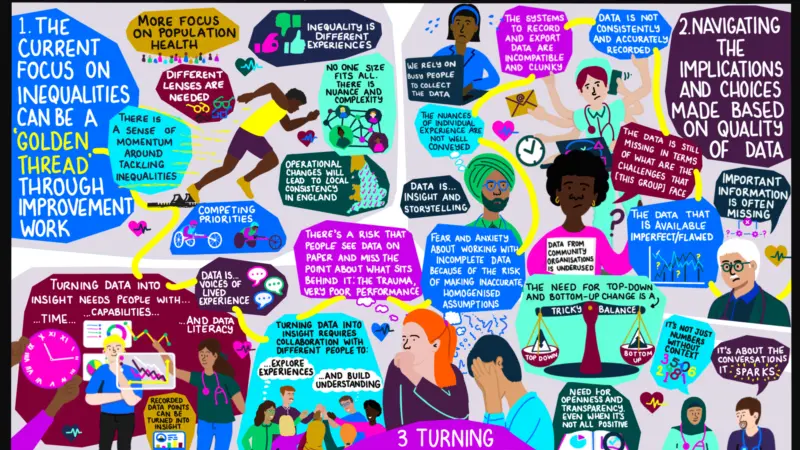Moving past backlogs and waiting times
Explore a wealth of insights into the challenges of addressing backlogs in care and making access equitable
On this page
Addressing care backlogs and improving access to services is an urgent NHS priority. We present case studies of six improvement projects tackling these issues locally, and a report on the effective use of data to support improvements.
Project overview
The huge pressures around access to care in the UK and Ireland are well documented. Challenges include record-high waiting lists for elective care, [ref]Blythe N, Ross S. ‘Strategies to reduce waiting times for elective care’ 2022[/ref] large hidden waits, and barriers to accessing care across many parts of the system.[ref]The Community Network. Hidden waits. The last impact of the pandemic on children’s services in the community. 2022[/ref][ref]BMA. NHS backlog data analysis. [cited April 2023] [/ref]
Everywhere patients look there are simply too few services with too little capacity to treat and support them in a timely manner.
Addressing these issues is an urgent system priority and an area where the skills and mindsets of those working to improve health and care are valuable in developing solutions. In July 2021 we spoke with a group of Q members to explore the challenges for people working to address backlogs and improve access to services. They told us they wanted to hear and learn from what others were doing, specifically around how to:
- balance short-term needs and long-term goals
- make better use of data to support improvements
- apply systematic improvement tools, methods and approaches to address both the technical and human side of change.
What we did
We worked collaboratively with members to identify and capture six case studies that touch on the important areas of learning cited by members. All of the case studies involve improvement projects to address challenges with backlogs in care. You can find them further down this page.
Thanks to Q member interviewers and reviewers: Chris Pavlakis, Joe Home, Larry Koyama, Lyn Williams, Minesh Khashu, Rachel Rainford, Sarah Clarke, Suzanne Wood and Ursula Clarke.
And interviewees: Helen Davies-Cox, Krystina Bones, Iain Smith, David Smith, Andy Sandford, Jack Bramhall, Paul Dias, Clara Day, John Mortimer, Miles Sibley, Sygal Amitay, Anil Mathew, Joanna Turville, Adam Binnie, Sophie Bulmer and Carol Dale.
Interviewees’ views may not represent the majority experiences or perspectives of those in their organisations and teams.
During the case study interviews, common issues of collection, analysis and use of data were raised as barriers to progress.[ref]Read more about what members told us during the interviews, in a blog post by Henry Cann and Jo Scott: Moving past backlogs: insights from improvers.[/ref] This led to a second insight project to hear from people who are confronting data challenges directly in their improvement work on backlogs and access. Here we used an action learning approach: bringing peers together to explore live issues.
Thank you to the participants on this project for sharing their experiences and expertise so openly and thoughtfully: Nicola Ballingall, Sarit Carlebach, Ellen Coughlan, Edmund Glynn, Daniel Hardy, Noshin Menzies, Clifford Mitchell, Eithne Mullen, Jillian Owens, Chris Pavlakis, Jo Phillips, and Mai Stafford.
Explore the learning
We published the findings of the action learning project in a report in April 2023. Explore the report’s insights into the key factors needed to make progress in using data to address backlogs and access in your organisation.
Summary of the key themes
- Acting with urgency but recognising the need for a longer-term focus. This includes being clear on the trade-offs between efficiency and equity and balancing immediate action with more deep-rooted change.
- Collecting and accessing better data on waiting lists and inequalities. This means drawing on national data where possible, but also investing in foundational data collection at a project level.
- Turning often imperfect data into action. The project highlighted the need to recognise the psychological toll and anxiety that working with imperfect data can cause. Also the time, capabilities, infrastructure and data literacy required to act on data.
- Recognising the benefits, and limitations, of applying a systematic improvement approach. Improvement can play an important role in defining priorities and problems, engaging staff, and co-producing with patients. But those working in quality improvement need to apply much greater focus to developing tools and methods that directly support equity and equality.
- Collaborating with and learning from others. We need to create spaces and processes where people working with data to improve access can share challenges and solutions.
Evidence that informed the findings
During the project we published the emerging insights in two interim reports.[ref]The Q Community. Moving past backlogs: how can a focus on data help to ensure equitable access to services? (Emerging insights part 1). July 2022[/ref][ref]The Q Community. Moving past backlogs: how can a focus on data help to ensure equitable access to services? (Emerging insights part 2). September 2022[/ref]

Explore the case studies
Better productivity and experience: embedding an improvement system
In a highly-pressurised context, implementing a systematic and enabling improvement approach can improve productivity, efficiency, and staff and patient experience.
Implementing patient initiated follow-up
Patient initiated follow-up (PIFU) may help services to better understand their patient lists and reduce unnecessary outpatient appointments. Senior and clinical buy-in, stakeholder engagement and patient communications are vital for successful implementation.
Discover more
-
About Q
3 minute readWe are a membership community collaboratively accelerating the improvement of care in the UK and Ireland. We learn together, support each other and share insights to address health system challenges. -
The Q team
1 minute readFind out more about the people helping to deliver Q.